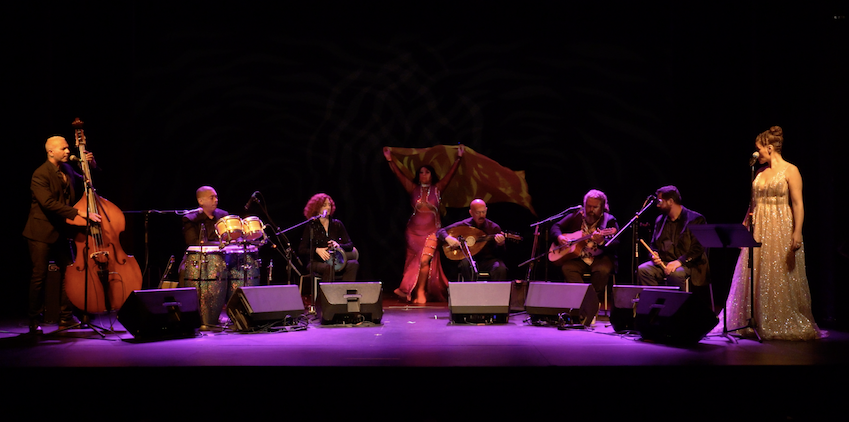How to Build a Bridge Across 11,000 Miles: The Story of a Film
Eight Artists and Two Diasporas, and the Enigmatic Song that Brought Them to Miami.

Stories, like music, thread the fabric of our lives and hold our communities together. The stories we tell ourselves matter. They form who we are, shape our world irreversibly. They change and influence others, bring us together despite our differences, or else they tear us apart. But all, without exception, share a miraculous habit of multiplication, an almost organic tendency to wildly proliferate, inspiring new and different stories to be shared, and with these give rise to new worlds as yet undreamt.
The story of how master belly-dance artist, advocate and scholar Tiffany “Hanan” Madera came to produce “Ya Habibi,” her second documentary film, is an inspiring example, a project that spans several years, if not decades, and numerous transformations tied up with another slew of stories ranging from the technical to the utterly fantastic.
In fact, stories are at the very heart of the film. From the storied song referenced in its very title —Ya Habibi: The Story of a Song— to the incredible story of its talented cast of eight artists (seven musicians and a dancer) of Arab and Cuban heritage, their converge in Miami for the musical journey of a lifetime, and the moving film that records it all— a multidisciplinary tour-de-force across two cultures and its diasporas, the Egyptian love ballad whose surprising Cuban origins unite the two, and the one-of-a-kind performance it all inspired.

A Song That Was Two, Two Cultures Made One
As with all good stories and films, it all began with a song. Or rather, two.
The first is Ya Habibi Ta‘ala, the Egyptian classic that gives the documentary its title. The other, the curiously unacknowledged historical source for the first: a song composed by the cuban Bienvenido Julián Gutiérrez in 1931, and made popular on the island by Cuarteto Machín, the famous quartet led by the great Cuban singer Antonio Machín.
That the title of this song is ‘Huerfanito’ —which translates literally to ‘Little Orphan’— is only one of the many serendipitous developments that make this song both the ideal context, and the organizing metaphor, for the collaborator’s historic exploration of diasporic experience and identity. Already in its Caribbean beginnings, the song speaks loudly to the nostalgic homelessness and the deep, traumatic loss that often plague life for those in the diaspora. Like many orphans, this song would be adopted into another family, transported across two cultures and several generations by way of loving and willful appreciation mixed with a bit of chance, and historical circumstance.
But a secret of this magnitude can seldom be kept for long —a fact most Cubans can personally attest to. As the years went by, and the growth of the worldwide web advanced triumphantly, if a bit haphazardly, post-modernity’s quixotic campaign to democratize knowledge for all, the story of the song’s unexpected origins garnered interest by the second.
Transformed several times through the ages, Ya Habibi Ta‘ala is a song whose secret history speaks to the strong cross-cultural connections between Cuba and the Middle East, and music’s powerful ability to signify and advance values like unity and understanding so vital, especially, for the diaspora.
Made famous by Asmahan, the exiled Syrian princess who became an icon of Arab music in the 1930s and 40s, the song was long thought to be an original composition of Asmahan’s brother, the famous Syrian-Egyptian composer Farid al-Atrache. But as time and the tireless work of a few tenacious journalists, and some perspicacious historians and sharp-eared ethnomusicologists would eventually reveal, there’s always much more to the story of the Egyptian classic than it first appears, a connection to the Caribbean that nobody could have predicted.
While indeed attributed to Farid’s work, the ballad’s previously unacknowledged connection to the traditional Cuban song reveals the fraught and complicated processes of dialogue and exchange, appropriation and transculturation that mediate the formation of new, life-affirming iterations of self, country, and kinship in the context of migration and diaspora—a new, hybridized and diverse cultural genealogy, founded on the dogged pursuit of contact, coexistence, and collaboration based on a mutual cultural adoration as rare as it is precious in our world today.
Whether stolen, borrowed or mindlessly appropriated, in its journey across the gulfs of cultural difference and ethnic divisions, Ya Habibi Ta‘ala became much more than a song. Transformed from its origins in rural Cuba into a veritable Middle Eastern classic thanks to the Syrian-Egyptian siblings who would serve as its adoptive parents, the song serves as a natural symbol of unity and transculturation—the perfect metaphor for the permeability of culture and identity and the often invisible processes that blur the borders and differences that would otherwise distinguish us, implicating us instead in each other’s lives and respective histories.
Though in some details contested, it’s a tale uniquely tailored for the troubled times we live, blurring, on the one hand, the staggering embarrassment of borders, fences, and walls erected to separate us in a world increasingly fractured by crises political and biological, a society beset by the public health imperatives of compulsory isolation and social distancing, and by the millenarian persistence of racial discrimination and rampant Islamophobia in the Western world.
How this relatively obscure cultural chimera of a song came to inspire the historic collaboration between artists of Arab and Cuban heritage chronicled in ‘Ya Habibi’, is another story still about the indefatigable search for cross-cultural connection and the urgent need for the genuine, love-driven forms of transculturation chronicled by the film itself.
In the relative innocence of 2019— way before the global pandemic reared its ugly head and began ravaging live arts dreams the world over, we at Live Arts Miami had envisioned this project with the same characteristic ambition but in a markedly different key: a live-concert collaboration between local belly dance artist Tiffany “Hanan” Madera and the talented multicultural ensemble of Michael Ibrahim’s world-renowned National Arab Orchestra bringing together Cuban and Arab musicians to explore the living links between Cuba and the Middle East.
From Ojalá to Ya Habibi, A Story of Hope
An equally historic and momentous celebration of the music and dance of the Middle East, this concert would serve as a direct extension of Ojalah / InshAllah, our hugely popular 2017-2018 cultural series celebrating the shared cultural heritage of Miami’s diverse communities through powerful, change-making performances that challenge harmful stereotypes and combat Islamophobia through music, dance, and other forms of cross-cultural dialogue and exchange.
Layali al-Andalus, which translates to “Andalusian Nights,” was the culminating event of the groundbreaking season, a truly magical and unforgettable show. This community celebration of Spanish and Moorish culture featured some of the most influential figures in Arabic music today, led by the prestigious National Arab Orchestra, and its Musical Director, Michael Ibrahim.

The stage seemed set for another incredible collaboration taking the exploration we started with Al-Andalus a step further in time and place. 2020, however, was already starting to loom large on the horizon, and pretty soon it became clear the fated year had other plans in mind, none of which included jam-packed concert venues, or a traveling cohort of world-renowned international musicians, singers, and dancers packing into planes and airports on their way to Miami, a city unknowingly on the brink of becoming a viral hotspot of tropical proportions.
Undeterred by the sobering twist in the plot, we decided to boldly push on, adapting the concert collaboration for what will surely be known in the history books as the year of virtual programs and social distancing, while honoring the original event’s celebration of cross-cultural connection and exchange. Transformed in scope and reach by virtue of its now potentially global audience, the concert gave way to a more intimate but no less momentous project: the filming and world release of Ya Habibi, a new documentary film by the amazing, all-female production team behind the award-winning documentary Havana Habibi.
“I was searching for a way to crystalize the various goals and themes behind the original concert now cancelled by the pandemic, and found it in the unbelievable story of ‘Ya Habibi Ta’ala’ and ‘El huerfanito.’ Both songs serve as an ideal framework for the collective and celebratory exploration of how cultures travel, how they bridge across our differences, diverge, and collaborate” says Madera of the upcoming release.
Along with Tiffany’s masterful rendition of the Raqs Baladi form of belly-dance, a special musical performance blending the original Cuban song and Asmahan’s famous adaptation serve to illustrate these central themes in the upcoming documentary, which also includes illuminating interviews with the international cast of award-winning musicians featured.
Separated by 90 years and 11,000 miles, their new rendition of the two songs taps into the loss and love felt across generations, and often expressed through music, by all those who live outside of their home country.
WORLD PREMIERE
Ya Habibi: The Story of a Song
Live on Crowdcast
Saturday, November 21
8 p.m. EST
Presented by Hanan Arts and Live Arts Miami in collaboration withO Cinema, FilmGate Miami and National Arab Orchestra.
Post-screening Panel Discussion and Q&A
After the film, hear from the artists and the amazing, all-female production team behind the documentary at a live Panel Discussion and Q&A, with “Ya Habibi” director Gina Margillo and co-producers Vivian Marthell and Tiffany Madera alongside Michael Ibrahim, conductor and Music Director of the world-renowned National Arab Orchestra.

Enjoy this virtual world premiere as part of the
2020 Havana Habibi Festival Online
Nov. 18 – 21
Four days of film, music, and traditional Egyptian Raqs Baladi (aka belly-dance) to celebrate cultural diversity and foster healing, unity, and understanding in our community.
Click here for more information and the full calendar of events.
